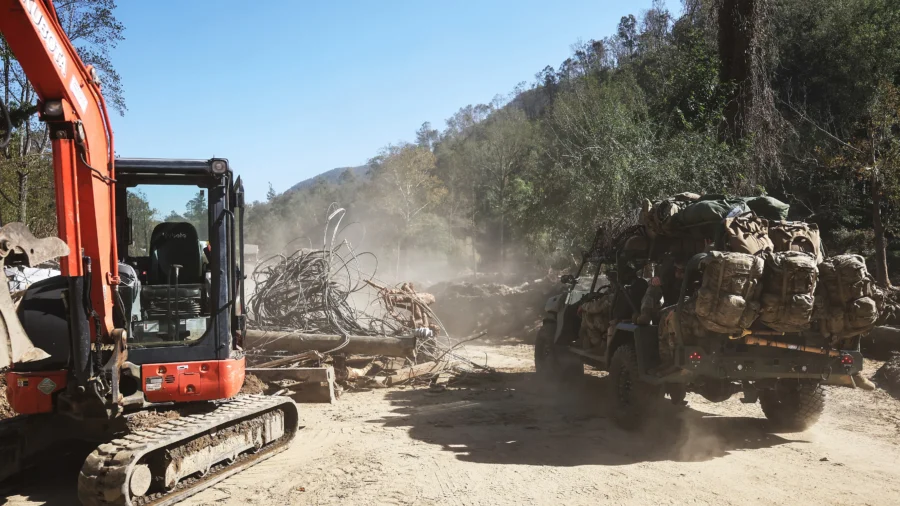A federal health agency has invoked a wartime act to facilitate the cleanup of North Carolina’s Baxter International medical facility, the largest manufacturer of certain intravenous (IV) solutions in the United States, after it was damaged by Hurricane Helene.
Baxter International Inc. said in September that it closed its North Cove facility in Marion, North Carolina after the hurricane brought “unprecedented rain and extensive flooding.”
The North Carolina plant is the source of 60 percent of the country’s IV fluid supply. After Hurricane Helene, hospitals, which use over 2 million IV bags daily for hydration and medicine, faced a shortage.
Earlier this month, the American Hospital Association (AHA), which represents almost 5,000 member hospitals, 43,000 individual members, and other health care organizations, urged the federal government to declare a national emergency, warning that patient safety is at risk due to a shortage of IV solutions.
“[O]ur members are already reporting substantial shortages of these lifesaving and life-supporting products,” the AHA said in an Oct. 7 letter to President Joe Biden.
A U.S. Department of Health and Human Services (HHS) spokesperson told The Epoch Times on Wednesday that it invoked the Defense Production Act of 1950 (DPA) to “help Baxter obtain materials needed to clean and rebuild the facility,” adding that it’s seeking “additional opportunities” within the DPA to assist the company.
HHS’s Administration for Strategic Preparedness and Response (ASPR) is engaging with the company to identify “supply chain challenges” while communicating with other domestic manufacturers “to support any material challenges that would hinder their ability to increase production levels.”
According to the Congressional Research Service in a 2023 report, the DPA was passed in response to the Korean War in 1950 and was based on the War Powers Acts of World War II to strengthen “military preparedness and capabilities.”
Over time, it was amended to “enhance and support domestic preparedness, response, and recovery from natural hazards, terrorist attacks, and other national emergencies.”
The DPA was invoked in the past as a COVID-19 pandemic measure to help ensure the availability of medical resources such as ventilators, personal protective equipment, and later vaccines, and to ensure that these resources were appropriately distributed throughout the health care system.
According to a Yale School of Management report, the DPA gives the president significant authority over the private sector to request its collaboration with the federal government.
This authority is to ensure that “critical and strategic” supplies are prioritized and allocated with adequate funding while constraints such as antitrust laws that could thwart progress are temporarily loosened.
‘Good Progress’
According to an Oct. 11 HSS update on Baxter’s progress, hospital orders went up 50 percent over the week due to a “sharp increase in product availability” as a result of federal action.
This included Food and Drug Administration regulatory action to allow “the temporary importation of 19 different IV solution and dialysis products” from international manufacturing plants “to bolster domestic supply” while the ASPR works to support airlifts into the country to get medical products to patients “as quickly as possible.”
On Oct. 11, the FDA released guidance written to allow hospitals flexibility in making their own IV solutions while there is a shortage.
In response to The Epoch Times request for comment, a Baxter spokesperson shared an Oct. 14 update in which it said the company has made “good progress” in its efforts to restore the facility while providing support to its employees, many of whom still have no power or water.
“We were thrilled to welcome back more than 1,000 employees to work last week, with an additional 1,000 remediation contractors on site to aid in the cleanup and recovery,” the press release said. “This week, we expect to have 3,000 people contributing to recovery efforts – with nearly 2/3 of those being Baxter employees.”
Naveen Athrappully contributed to this report.
From The Epoch Times

